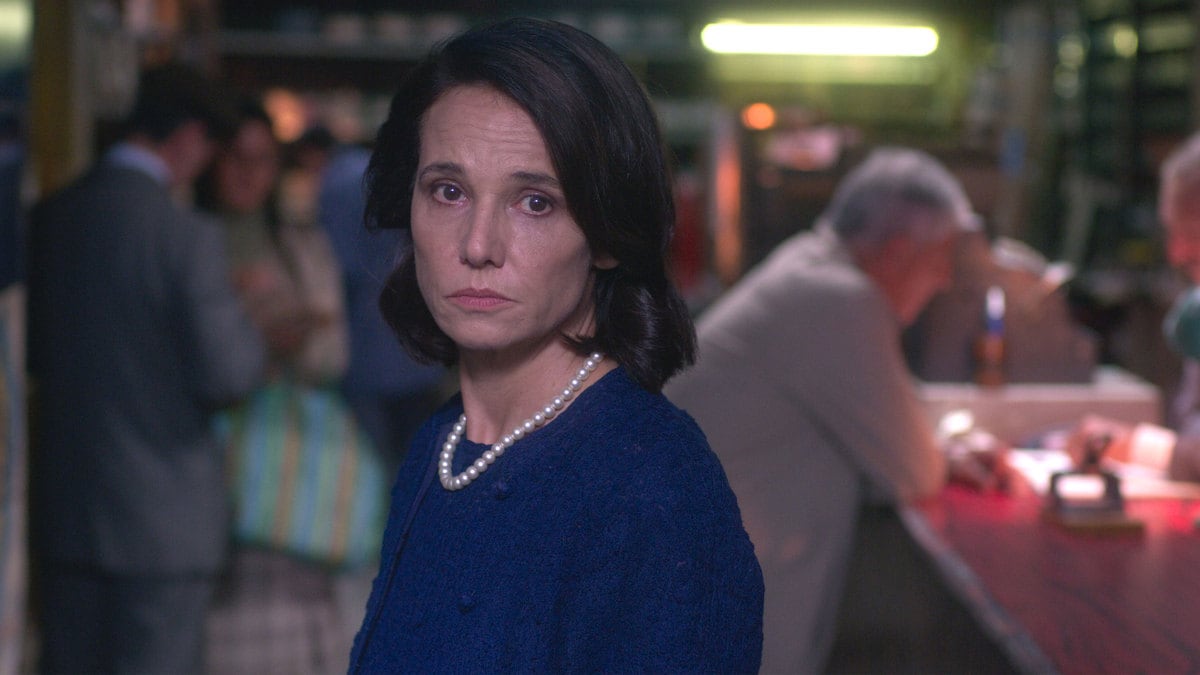A Chilean radio station welcomes American listeners as it begins playing cheery national music, only for the transmission to be interrupted by a government broadcast prohibiting anyone from addressing politics. A pleasant dinner conversation is fleetingly punctuated by critical remarks about the Pinochet government, and then again proceeds along its superficial course.
Domestic chitchat in a kitchen is complemented by two hired workers’ private conversation about a man who’s gone missing since being picked up by an army patrol. At all times, and in every way, Chile ’76 is a film defined by layers, with pleasant everyday facades masking a dark, corrupt authoritarian underbelly.
The directorial debut of actress Manuela Martelli, which premiered at last year’s Cannes Film Festival, Chile ’76 (in theaters May 5) is a 1976-set period thriller of beguiling power, energized by its portrait of one woman’s heroism and the means by which it’s motivated by guilt, regret, fury, and despair—the last of which, ultimately, proves inescapable.
Resonating as a memory piece conjured from its maker’s own history, and crafted with a meticulousness that’s as central to its suspense as is Mariá Portugal’s ominously sparse, disorienting electronic score, Martelli’s maiden feature is a redolent snapshot of a time, place, and people brutalized, overtly and subtly, by dictatorship. It’s a drama whose formal concision and elegance amplifies its desolation.

Just as audio snippets regarding Pinochet’s reign of terror frequently peek through its action’s ordinary surface, so too does Chile ’76 highlight Chile’s divided nature through sly visuals.
Travel between the frame’s foreground and background is fraught with meaning, as is the sight of characters passing through doorways and gazing out windows. Everything appears routine and yet is dangerously partitioned in this South American country, all of it courtesy of Pinochet, who’s rarely mentioned but whose presence is ever-present. Three years after coming to power via a coup, the general-turned-president’s shadow looms like a storm cloud over this tale, darkening its bright beach setting and, with it, the disposition of its residents, including one well-to-do housewife with a desire to channel her misery into action.
Carmen (Aline Kuppenheim) is a middle-aged wife and mother who’s traveled ahead to her new beachside summer house without her spouse Miguel (Alejandro Goic)—a doctor who’s working in Santiago—to oversee renovations ahead of her clan’s impending arrival. Her hairstyle neat and her neck frequently adorned with pearls, Carmen is a figure of posh poise and elegance, albeit one marginalized by her spouse and her aspiring-physician son Tomás (Gabriel Urzúa) in a sexist manner that’s emblematic of their patriarchal homeland.
As is well-known to her husband and her housekeeper Estela (Carmen Gloria Martinez), Carmen has a habit of treating her ennui by excessively popping pills and booze. The morning after one such bout of imbibing, Carmen is awakened in her bedroom by local priest Father Sánchez (Hugo Medina), whom she’s brought children’s clothes to donate to the parish. He, in turn, has brought something for her—or, rather, someone.
In a small room in his modest church, Father Sánchez has hidden away Elias (Nicolás Sepúlveda), a young man with a gunshot wound in his leg. There’s scant conversation about how he might have suffered such an injury, in large part because the specifics don’t really matter; what’s apparent is that he’s been hurt due to some dissident anti-Pinochet behavior for which he’s now being sought by authorities.
Carmen, who routinely spends her time reading to the blind, immediately assumes caretaker duties for Elias, endeavoring to procure drugs to treat his leg from her husband and, also, from a hospital where she claims to need them for a distressed dog. This is a secret operation, and Carmen carries it out with a matter-of-fact attitude that suggests that she believes the only remedy for her weary, dishonest condition—happy on the outside, melancholy on the inside—is striving to affect a modicum of change.

“What a sad country,” laments Father Sánchez, who later confesses to Carmen that he once ratted out a couple of revolutionary kids whom he was protecting, and that “it was my fault” they were eventually murdered. Chile ’76 is a study of small individuals attempting to do what’s right—and assuage their own dissatisfaction and shame—in whatever minor way they can.
Portugal’s buzzing, droning audioscape enhances the material’s menacing mood as well as reflects Carmen’s fear and paranoia, which mounts as Elias slowly recovers and, consequently, asks her to help him contact his comrades in order to facilitate his departure. In an area where no one can be completely trusted, be it the police, shop owners or neighbors, Carmen’s mission is inherently and intensely perilous, and director Martelli stages it with an economy that flirts with dreamy obliqueness, the better to convey her protagonist’s hazy, in-over-her-head uncertainty and panic.
Chile ’76 is awash in stratified compositions in which Carmen moves between distinctive close/distant spaces—an expression of Chile’s divergent worlds, which is a notion also intimated by recurring motifs of reflective mirrors and swirling, blending paint colors. With invigorating confidence, director Martelli lets her form do the talking. Before long, Carmen is knee-deep in a conspiracy for which she is ill-equipped and yet is unwilling to abandon.

Her efforts beget scenarios of sudden, pulse-pounding tension, from her suspicion that a car may be tailing her, to a traffic stop by a police officer that takes place after the government-mandated curfew, to a visit to a remote café where she’s hit upon by a man whose demeanor is as unsettling as are current news stories about a dead girl discovered at a nearby beach—a tragedy about which Carmen’s grandchildren whisper, further casting an omnipresent pall over her day-to-day.
“Chile was a destroyed nation, a society with a broken spirit, and a social structure that was divided and corrupt,” Pinochet is heard declaring midway through Chile ’76, but it’s Carmen and her fellow underground rebels who appear most splintered, trapped between two uneasy realities. Led by Kuppenheim’s coiled, interior performance as an individual who’s desperate for transformation and escape, and who learns an agonizing lesson about the possibility of achieving either under authoritarian rule, it’s a film of creeping dread and hopelessness—both of which are ultimately epitomized by periodic images of violent, uncaring waves crashing against the beach’s rocks.
Liked this review? Sign up to get our weekly See Skip newsletter every Tuesday and find out what new shows and movies are worth watching, and which aren’t.






